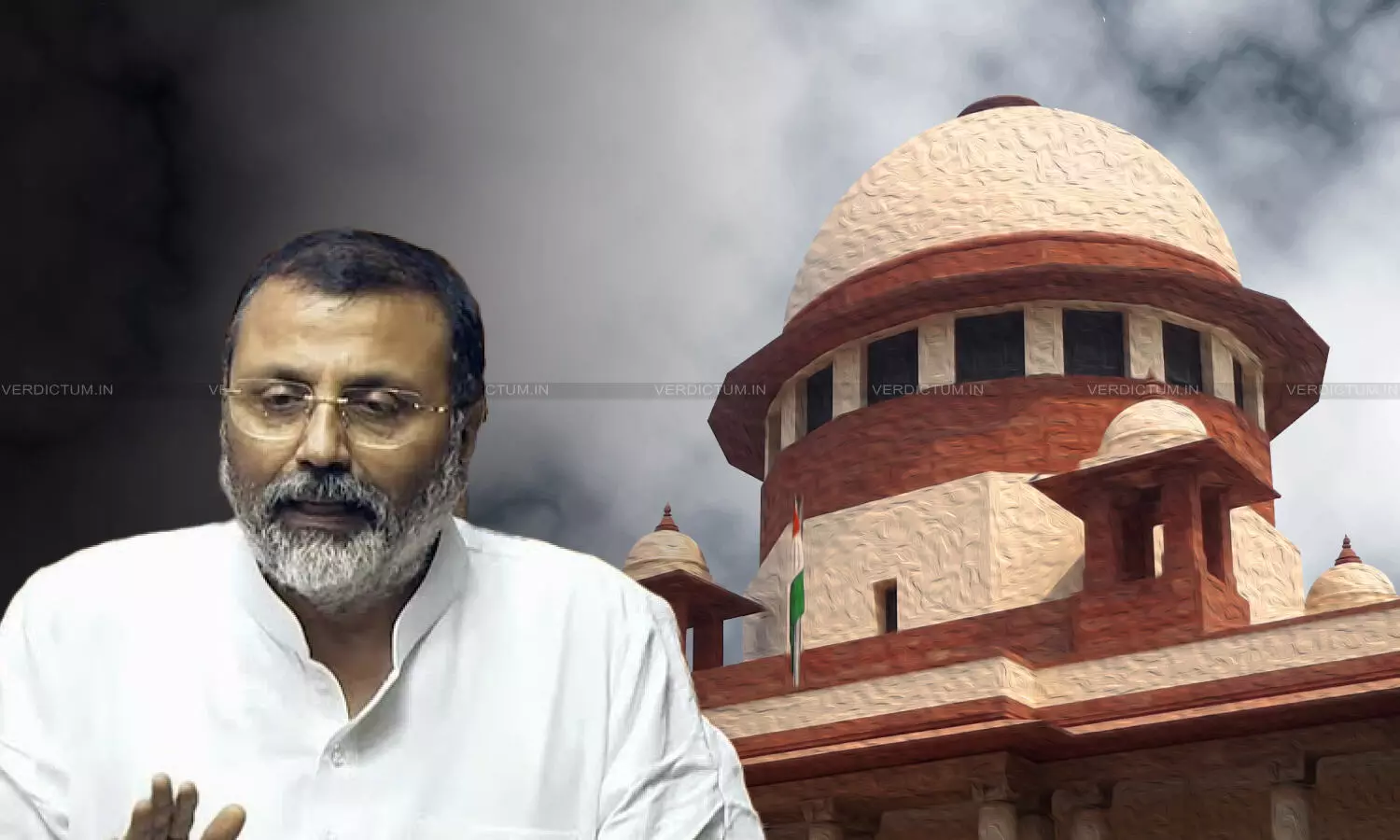
Nishikant Dubey, Supreme Court
Courts Not Fragile As Flowers: Supreme Court While Dismissing Contempt Petition Against BJP MP Nishikant Dubey
 |
|The petition before the Supreme Court sought initiation of suo-motu criminal contempt proceedings against Nishikant Dubey for having made deliberate and scandalizing remarks against the Supreme Court of India and the Chief Justice of India.
While observing that Courts are not as fragile as flowers to wither and wilt under ludicrous statements, the Supreme Court has refrained from taking action against BJP MP Nishikant Dubey for his remarks made against the Chief Justice and the Supreme Court of India. However, condemning such behavior, the Apex Court held that hate speech cannot be tolerated and any attempt to cause humiliation of the targeted group is a criminal offence.
The petition before the Supreme Court was filed under Article 32 read with Article 129 of the Constitution of India seeking initiation of suo motu criminal contempt proceedings against Dubey for having made deliberate and scandalising remarks against the Supreme Court of India and the Chief Justice of India.
A direction was also sought to the Union of India, Ministry of Home Affairs, to lodge a First Information Report under the Bharatiya Nyaya Sanhita, 2023 and for a direction to the Union of India, Ministry of Home Affairs, to issue an advisory to all Chief Secretaries to curb hate and provocative speeches by political parties and their leaders relating to the Waqf (Amendment) Act, 2025, and its hearing before the High Court.
The Division Bench comprising Chief Justice Of India Sanjiv Khanna and Justice Sanjay Kumar said, “At the same time, we are of the firm opinion that courts are not as fragile as flowers to wither and wilt under such ludicrous statements. We do not believe that the confidence in and credibility of the courts in the eyes of the public can be shaken by such absurd statements, though it can be said without the shadow of doubt that there is a desire and deliberate attempt to do so.”
The Petitioner, Advocate Vishal Tiwari, appeared in person.

Reasoning
The Bench, at the outset, observed that judicial pronouncements result in an order or a decision which may aggrieve a party or sometimes a section of the public. Critical analysis and objective criticism of an order’s reasoning or even its outcome are protected under the fundamental right to free speech and expression under clause (a) of Article 19(1) of the Constitution of India.
According to the Bench, the assertions made by Dubey intended to scandalize and lower the authority of the Supreme Court of India and they reflected the clear intent to impute motives to the Bench itself by naming the Chief Justice of India as “responsible for all the civil wars happening in India” and “in order to incite religious wars in this country, it is only and only the Supreme Court that is responsible”. “Sections 3 and 4 of the Act carve out exceptions which, prima facie, are not attracted. There is no ‘civil war’ in India”, the Bench explained.
Thus, refraining from taking any action, the Bench held, “Courts believe in values like free press, fair trial, judicial fearlessness and community confidence. Thus, courts need not protect their verdicts and decisions by taking recourse to the power of contempt. Surely, courts and judges have shoulders broad enough and an implicit trust that the people would perceive and recognize when criticism or critique is biased, scandalous and ill-intentioned".
Clarifying that judicial decisions are made following legal principles and not in keeping with political, religious or community considerations, the Bench said, “While we are not entertaining the present writ petition, we make it clear that any attempt to spread communal hatred or indulge in hate speech must be dealt with an iron hand. Hate speech cannot be tolerated as it leads to loss of dignity and self-worth of the targeted group members, contributes to disharmony amongst groups, and erodes tolerance and open-mindedness, which is a must for a multi-cultural society committed to the idea of equality. Any attempt to cause alienation or humiliation of the targeted group is a criminal offence and must be dealt with accordingly.”
Thus, the Bench dismissed the Petition.
Cause Title: Vishal Tiwari v. Union of India & ors. (Neutral Citation: 2025 INSC 647)
Appearance:
Petitioner: Petitioner-in-Person